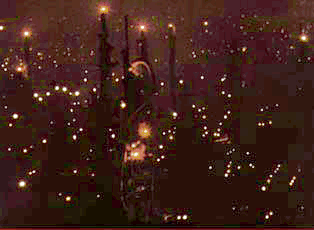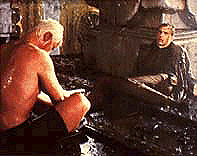



I like the movie Blade Runner. Ridley Scott gave it a dark many layered texture. And the scene where Ray Batty is dying in the rain, talking about all the things that he has seen that will be lost, is a scene I will always remember. There is a great Blade Runner Web page , where I was able to find a link to a complete transcription of the Blade Runner movie, so I can quote Roy's dying words correctly:
"I've seen things you people wouldn't believe. Attack ships on fire off the shoulder of Orion. I watched C-beams glitter in the darkness at Tannhauser Gate. All those moments will be lost in time, like tears in rain. Time to die."
I also like K. W. Jeter and I have read most of his books. Like Ridley Scott, Jeter gives his books a dark feel, where the characters are complicated and the world is gritty. So I was looking forward to reading Jeter's new book, Blade Runner 2: The Edge of Human. After reading the book, however, I am not entirely satisified.
In the Blade Runner movie, the images that Ridley Scott builds, of the dark rainy Los Angeles of the future, allows the viewer to suspend belief and not examine the plot too closely. Books are different. And perhaps one of the problems with Blade Runner 2 is the plot burden that Jeter accepts. He attempts to fill many of the plot holes that I had not previously noticed in the movie, while still carrying his own plot forward. For example, why are the replicants so human that they are difficult to tell from the real thing? Why not just build robot like androids who will happily serve humanity in what ever capacity they are placed? Since Jeter devotes space to filling in the Blade Runner plot, there is fragmentation between Jeter's story and the original Blade Runner story. Jeter's story suffers and is more simplistic as a result. Characters from the original Blade Runner story reappear in Blade Runner 2, not always to good effect. While Jeter does deal with the moral dilemma of the Blade Runners who hunt down beings that are virtually human in every way, the story tends to be shallow otherwise. Like the movie, the book ends with an enigmatic, but elegant plot twist.
Ian Kaplan - 2/96